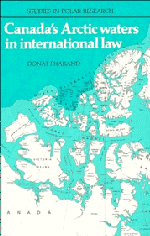Book contents
- Frontmatter
- Contents
- Figures
- Tables
- Foreword
- Preface
- Acknowledgements
- Part 1 The Waters of the Canadian Arctic Archipelago and the Sector Theory
- Part 2 The Waters of the Canadian Arctic Archipelago as Historic Waters
- 5 The basic characteristics of historic waters
- 6 Requirements of historic waters
- 7 State practice of Arctic states on historic waters
- 8 Historic waters applied to the Canadian Arctic Archipelago
- Notes
- Part 3 The Waters of the Canadian Arctic Archipelago and Straight Baselines
- Part 4 The Waters of the Canadian Arctic Archipelago and the Northwest Passage
- Notes
- General Conclusion
- Appendix A The 1825 Boundary Treaty, Great Britain and Russia
- Appendix B The 1867 Boundary Treaty, United States and Russia
- Selected bibliography
- Index
6 - Requirements of historic waters
Published online by Cambridge University Press: 20 January 2010
- Frontmatter
- Contents
- Figures
- Tables
- Foreword
- Preface
- Acknowledgements
- Part 1 The Waters of the Canadian Arctic Archipelago and the Sector Theory
- Part 2 The Waters of the Canadian Arctic Archipelago as Historic Waters
- 5 The basic characteristics of historic waters
- 6 Requirements of historic waters
- 7 State practice of Arctic states on historic waters
- 8 Historic waters applied to the Canadian Arctic Archipelago
- Notes
- Part 3 The Waters of the Canadian Arctic Archipelago and Straight Baselines
- Part 4 The Waters of the Canadian Arctic Archipelago and the Northwest Passage
- Notes
- General Conclusion
- Appendix A The 1825 Boundary Treaty, Great Britain and Russia
- Appendix B The 1867 Boundary Treaty, United States and Russia
- Selected bibliography
- Index
Summary
The conventions are completely silent as to the legal requirements for the existence of historic waters. However, a number of authoritative studies have been made and it is generally agreed that three requirements must be met before a claim to historic waters is duly established. These are: (1) the exclusive exercise of State authority; (2) long usage or the passage of time; and (3) the acquiescence of foreign States. In addition to these requirements, three related questions must also be considered: (1) the legal effect of protest; (2) the vital interests of the claimant State; and (3) the burden of proof. This chapter will address those six points in succession.
Exclusive exercise of State authority
Since a claim to historic waters is one over a maritime area which the coastal State considers as an integral part of its national territory, the type of jurisdiction exercised over that area should be essentially the same as that being exercised on the rest of the territory. More precisely, the coastal State must exercise an effective control over the maritime area being claimed to the exclusion of all other States. Naturally, the extent of control will vary depending on a number of factors such as the size of the maritime area, its remoteness and the degree of its usability. The actual control might be limited, but yet sufficient, in remote areas. In the words of Professor O'Connell, ‘just as in the case of remote and little used seas, very little in the way of effective exercise of sovereignty need be required’, to show that a State took whatever action was necessary to assert and maintain its authority and control over the area in question.
- Type
- Chapter
- Information
- Canada's Arctic Waters in International Law , pp. 97 - 105Publisher: Cambridge University PressPrint publication year: 1988



